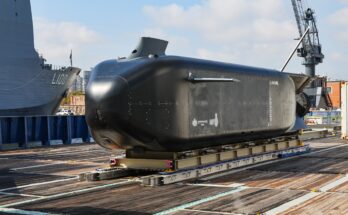A Taiwanese request to the U.S. for an $8 billion government-to-government sale of 66 Lockheed Martin F-16V Block 70 jet fighters appears to have some momentum, as reports indicate the Trump administration has informally given approval for the sale.
The move comes as the U.S. and China remain embroiled in a trade dispute that could turn more tense over a sale to Taiwan, a de facto independent nation whose historical ties to the mainland fuel Beijing’s sovereignty claims over the island.
Because Taiwan is effectively marginalized on the global market due to the reluctance of arms-producing nations to sell it high-end platforms and elicit rebukes from China, its principal source of supply has historically been the United States.
But over time the U.S. became reluctant to provide higher-end materiel such as combat aircraft to Taiwan over fears of provoking Beijing.
The latest proposed sale would involve the F-16Vs as a long-term replacement for the Taiwanese Air Force’s inventory of Northrop F-5E Tigers that were brought into service in the 1970s.
Taiwan is already in the process of upgrading its existing stock of 145 F-16A/B fighters to the latest Lockheed Martin F-16V (Viper) configuration under a roughly $4.2 billion program referred to by Taiwan as the “Phoenix Rising” project.
The pending F-16V purchase is a reboot of earlier efforts to procure 66 new-build F-16C/D Block 50/52 fighters that gradually, despite negative signals from Washington toward Taipei’s combat aircraft requests, grew into an ambition to acquire the Lockheed Martin fifth-generation F-35 Lightning II stealth fighter.
Taiwan tried to submit letters of request for price and availability data on F-16C/Ds on four separate occasions since 2003, with the most recent being an effort to convince the U.S. government to grant it access to a squadron of F-16C/D Block 50/52 jet fighters in order to plug a capabilities gap that would open up during the lengthy Phoenix Rising upgrade of the existing Taiwanese F-16 fleet.
These requests were all deferred by successive White House administrations, largely due to pressure from China. With Beijing warning that such a sale would cross a “red line,” the Obama administration opted to ignore the Taiwanese request rather than risk antagonizing China.
But the current White House administration is more inclined to reassert long-standing U.S. support for Taiwan while incurring Beijing’s wrath.
Nonetheless, a sale would still require approval from Congress, although that is expected to pass on a bipartisan basis. For now the sale has been passed from the State Department to the House and Senate Foreign Affairs Committees for informal review and approval. This will be followed by a requisite 30-day formal review process prior to the issuance of a letter of offer and acceptance to Taiwan by the State Department regarding the sale. After this, Taiwan and Lockheed Martin would still need to negotiation a final contract.
Reports of an impending deal drew an anticipated response from China. Foreign Ministry spokesperson Geng Shuang stated on August 19 that the pending F-16V sale would represent a violation of Beijing’s One-China Principle, warning that countermeasures against Washington will be taken should the sale go forward.
Earlier, in July, China stated it would impose sanctions on U.S. firms involved in sales to Taiwan of M1A2T Abrams main battle tanks and other equipment via a $2+ billion Foreign Military Sales package.
Dan Darling is Forecast International’s director of military and defense markets. In this role, Dan oversees a team of analysts tasked with covering everything from budgeting to weapons systems to defense electronics and military aerospace. Additionally, for over 17 years Dan has, at various times, authored the International Military Markets reports for Europe, Eurasia, the Middle East and the Asia-Pacific region.
Dan's work has been cited in Defense News, Real Clear Defense, Asian Military Review, Al Jazeera, and Financial Express, among others, and he has also contributed commentary to The Diplomat, The National Interest and World Politics Review. He has been quoted in Arabian Business, the Financial Times, Flight International, The New York Times, Bloomberg and National Defense Magazine.
In addition, Dan has made guest appearances on the online radio show Midrats and on The Media Line, as well as The Red Line Podcast, plus media appearances on France 24 and World Is One News (WION).




